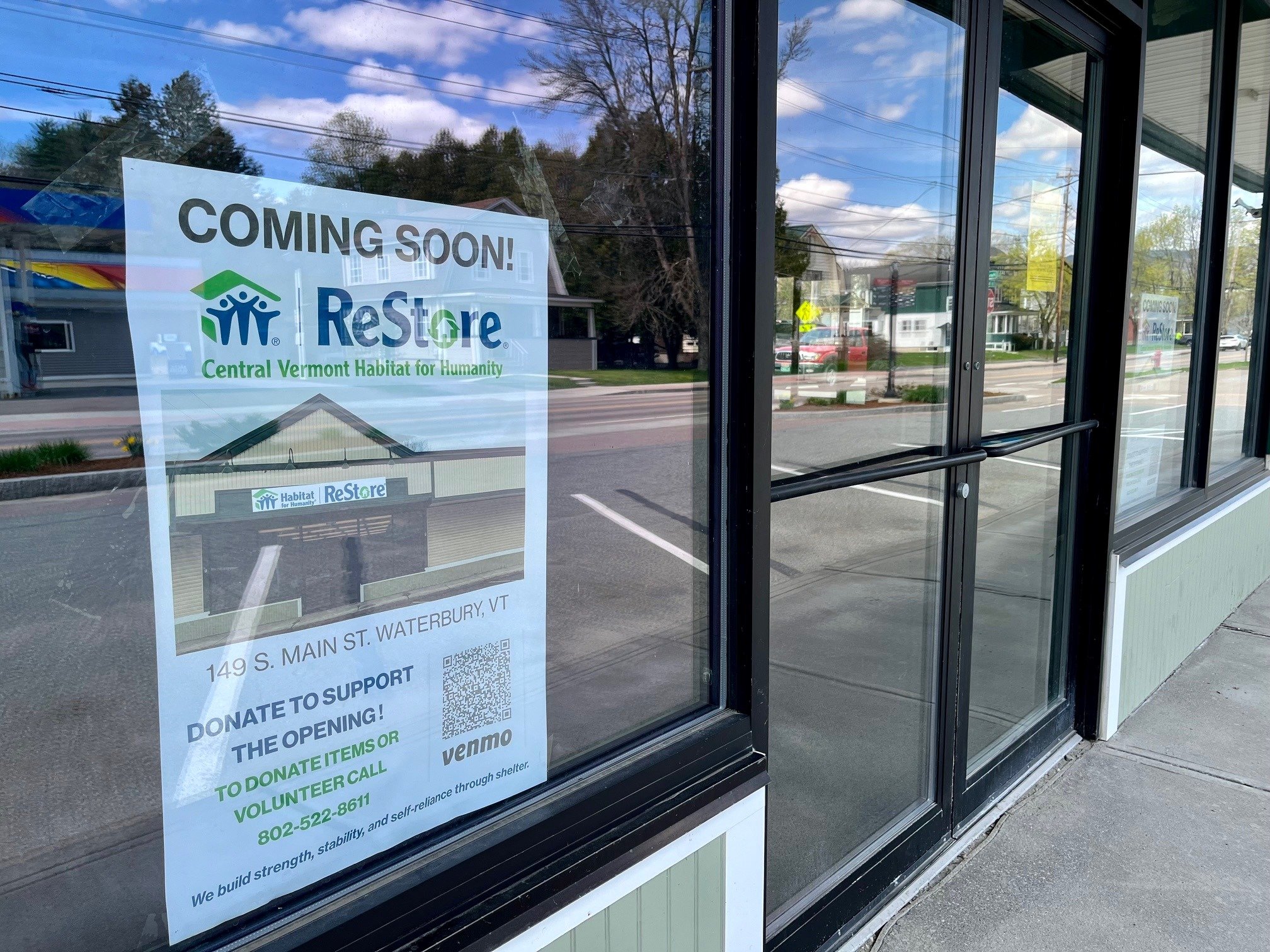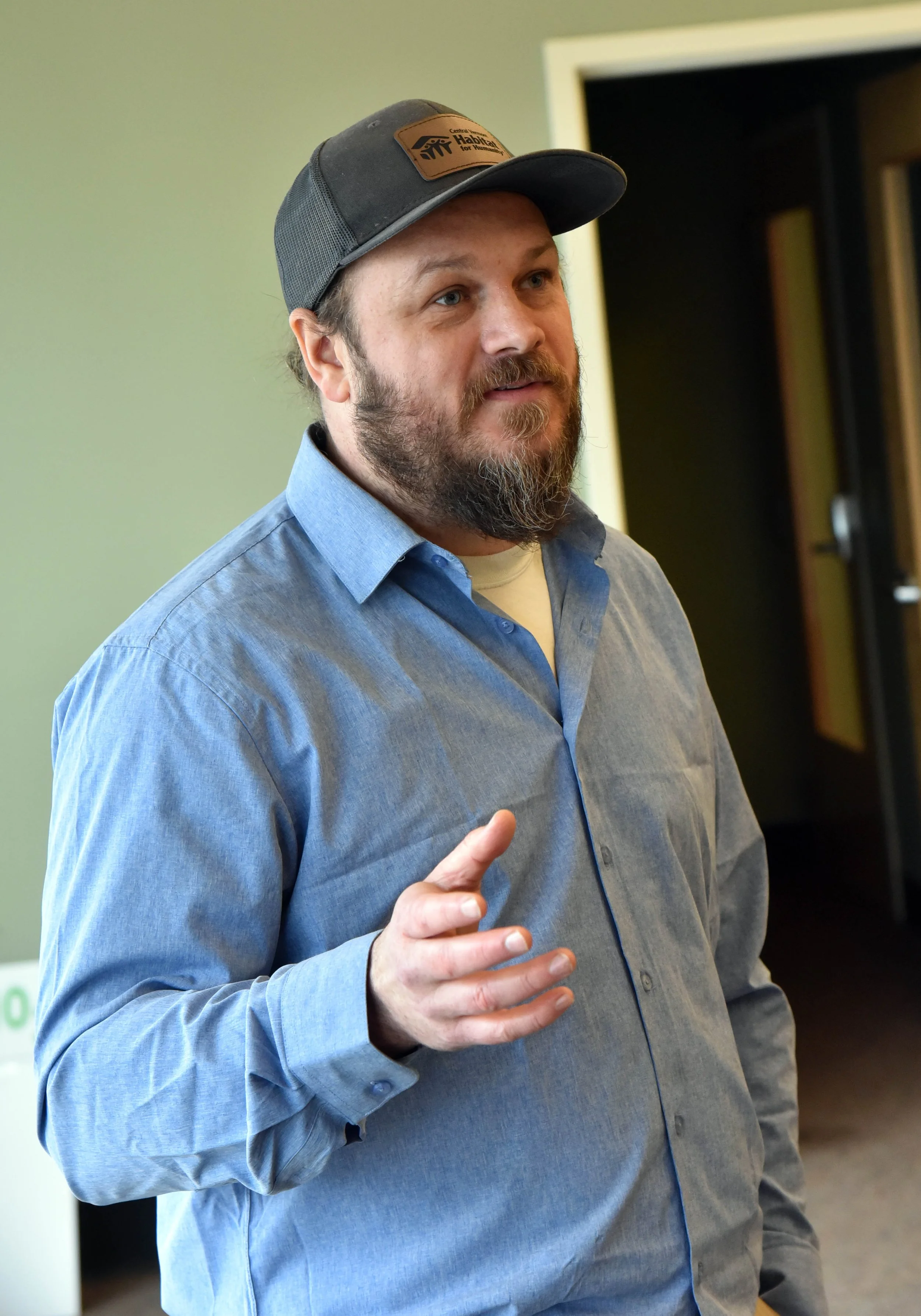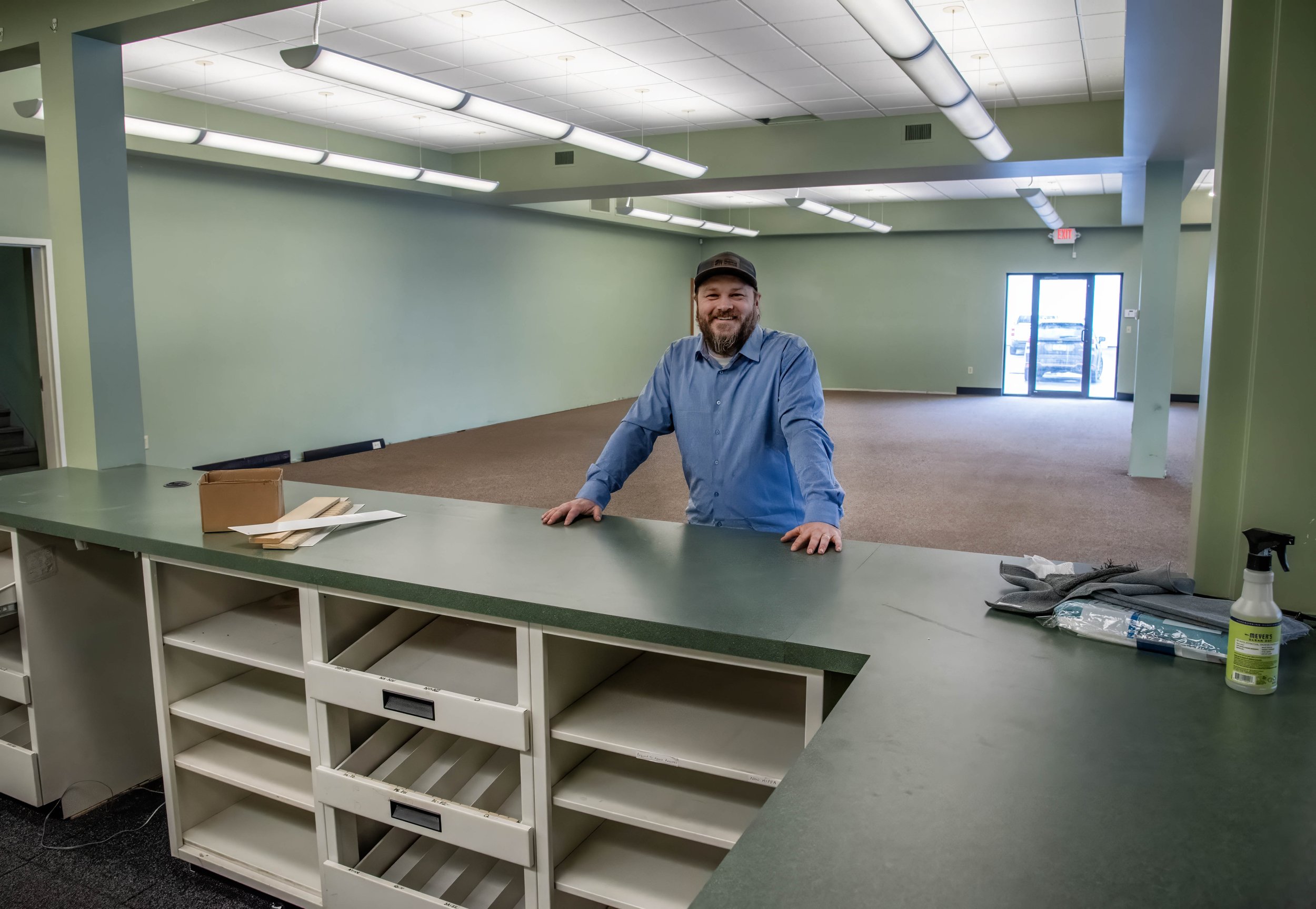New Central Vt. Habitat for Humanity ReStore lands a home in Waterbury
May 3, 2024 | By Sandy Yusen | Correspondent The ReStore will open its doors to the public June 7, selling donated furniture and other home goods to benefit its homeownership program. Temporary signs encourage donations and volunteer involvement. Photo by Sandy Yusen
For seven years, the retail storefront next to Subway on South Main Street has stood empty, after Waterbury Pharmacy sold its business to Kinney Drugs in 2017 and vacated the space. Work is underway to bring new life to the spot later this spring when ReStore, the retail operation run by Central Vermont Habitat for Humanity opens its doors in early June.
In March, the Montpelier-based regional organization of the well-known Habitat for Humanity international nonprofit signed a three-year lease for the 5,478-square foot retail space, with an option to renew for two additional three-year terms. The building is owned by Aubuchon Realty Corp., a commercial real estate company under the Aubuchon corporate umbrella which includes the hardware chain that once occupied the building.
Waterbury’s ReStore will be the sixth such outlet in Vermont and the first within the Central Vermont Habitat’s region of Washington and Orange counties.
Similar to ReStores nationwide, it will accept donations of new and lightly used furniture, appliances, building and construction materials, and other household goods, and sell them to the public at reduced prices. Central Vermont Habitat for Humanity Executive Director Zachariah Watson explains that the store will provide a sustainable source of funds for the organization, which has been building and renovating energy-efficient, affordable homes for low-income families in the region since 1989.
A good-sized retail footprint
The retail space, which has remained unchanged since it housed the pharmacy, easily lends itself to the new venture. Even though it is smaller than most ReStores, Watson describes the new space as “decent-sized, good for starting, and there’s room to grow.” Most of the open floor space will be dedicated to showcasing furniture, with a section for displaying smaller home goods. The checkout and cash register will be located at the former pharmacy’s counter, and space has been carved out for the ReStore manager’s office.
The nearly 5,500 square feet includes the same retail space as the former pharmacy, as well as some storage and upstairs office space. Photo by Gordon Miller
The back half of the building will serve as a warehouse for storage, along with a restroom and break room. A mezzanine on the second floor shared with the neighboring Subway restaurant, houses utilities and additional storage space. Double doors in the back of the store provide ample clearance for loading and unloading donations, and a permanent dumpster will be placed in back to discard unwanted goods, Watson explained.
Customers will be able to park in the public spaces in front of the building and on the building’s north side, which is also used by customers at the NAPA auto parts store next door. Asked whether this would be enough parking for ReStore customers, Watson joked, “I don’t know…we’ll find out. I hope it’s not enough.”
Cultivating a steady flow of quality merchandise
As with most resale businesses, donations can be unpredictable, but Watson aims to find a balance between encouraging a steady stream of donations while ensuring quality. “What I’ve been told is what’s exciting about a ReStore and makes every day a challenge as well, is that you never know what’s going to come through that door,” he said. “You want to be discerning about what you get because trash bills add up pretty quickly. But you also want to say yes to people so they keep coming back and bringing you things.”
A staff member or volunteer will monitor donations each day as they come in to check that they meet store guidelines. “Each ReStore can determine what they want to sell and what they don’t sell. We have a list right now of things that we’re going to start out with and we will kind of adjust as we go,” Watson said.
The store will not accept items that include chemicals, products with recalls, products for children under 12, clothes, or books.
In addition to accepting drop-off donations, ReStore purchased a 15-foot box truck to accommodate pick-ups of goods anywhere within 45 minutes of Waterbury. Watson has already begun to accept donations, which are currently scheduled by appointment until the store officially opens to the public on June 7.
Staffing, renovations, permitting
Watson has been busy over the last several months cleaning up and renovating the space, working through permitting, and hiring staff. His first step in staffing up was to hire Store Manager Harold Blake, who started on April 25. A Barre resident, Blake has extensive experience spanning maintenance, buildings and grounds, contractor work, and retail. He most recently served as the maintenance and housekeeping director for an assisted living facility in central Vermont. He has worked in wastewater facilities and as a masonry contractor, and also started and ran video and pet food supply stores.
Since coming on board, Blake has been training at the Williston ReStore. He will also tap into Habitat for Humanity International’s training program, ReStore University, which trains new staff on how to run stores effectively. He and Watson will bring on two additional ReStore staff members to be floor supervisors and donation ambassadors.
According to Waterbury Zoning Administrator Mike Bishop, ReStore now has all of the necessary town permits to move forward with renovations and open as planned. Located in a Special Flood Hazard Area on town zoning maps, the building sustained minor damage from last summer’s flooding, but was spared in the December flood. During a tour of the space in April, Watson noted that a portion of the warehouse space was coated with a fine film of silt, presumably from flooding. He said he plans to rip up the carpeting which sustained water damage at the entryway in order to expose the linoleum tile underneath.
The danger of future floods doesn’t phase Watson. “This is the type of business you would want to have in a flood plain,” he said. “It’s donated material that was basically one step away from the landfill to begin with, and it’s donated so it’s not our cash inventory. If there is a flood here, we’re renting so we’re not responsible for the cost of the building, so financially it’s not a liability for us, and if we lose product then we throw it away and we start over again.”
Why Waterbury?
Watson said he and his team chose Waterbury over other potential locations in Randolph and Barre given the high visibility and traffic along South Main Street. Central Vermont Habitat for Humanity also has an existing relationship with the landlord, as Aubuchon had supported the organization in the past with donated nails and other home building supplies.
Zachariah Watson says Waterbury offers a niche to support the ReStore's retail business and Central Vermont Habitat for Humanity's housing mission. Photo by Gordon Miller
A major factor in the site selection was the potential for donations of goods from individual households and businesses. “We did a lot of analysis of why we want to be in Waterbury specifically,” Watson shared. “We looked at what we call donor households – what are the number of households in the area that are likely to donate to us. We found that there were about 16,000 households within a 30 minute drive of Waterbury that could sustain a ReStore here.”
Waterbury’s proximity to nearby resort towns with a significant number of second homes is also likely to generate donations as properties change hands. Ski resort hotels and inns are also a good source for donations, he pointed out.
“We found that there’s about 40 hotels/inns within 40 minutes of us, and they also typically have a pretty steady cycle of replenishing,” Watson said.
In moving to Waterbury, it was important to Watson to minimize ReStore’s potential competition with existing businesses. The Barre location Watson considered had Goodwill and ReSOURCE outlets nearby. ReSOURCE, a similarly named but separate organization, is a Vermont-based nonprofit that focuses on resale as a vehicle for workforce development and training programs.
Waterbury’s resale landscape includes a few antique stores in Waterbury Center, as well as Bargain Boutique on Main Street and the State Surplus Property outlet on U.S. Route 2 -- places that Watson believes are complementary rather than direct competitors.
“When I came here I went down to the Bargain Boutique and I chatted with [owner] Kathy Cummings, and I said, ‘How do we do this in a way that lifts each other up?’ And we talked about how we create an environment of saying ‘yes’ to folks that want to drop off stuff.” The two discussed channeling donations between the two stores that best match their mix of products, he said.
Cummings isn’t concerned about the ReStore’s arrival. “I don’t think there will be a big clash,” she said. She believes the growth in thrift over the years creates opportunities for multiple businesses. “When I first started 30 years ago, people didn’t want to buy used, and there weren't these kind of stores back then.”
Today, upcycling and reuse are trendy. Cummings said she recently experienced a surge in customers including college students from Burlington after a customer posted a TikTok video from her store.
Nina Towne, owner of Proud Flower, maintained a small boutique adjacent to her flower shop that included home goods sold on consignment, but she ramped down the consignment at the end of last year to expand her flower offerings and focus on a selection of curated antique, vintage goods that are both gently used and new. She welcomes the ReStore and the expansion of resale in Waterbury. “It’s a mecca, it’s all one-of-a-kind and that’s the beauty of it. No one is stepping on anyone’s toes,” she said.
Watson hopes that Waterbury’s ReStore will rejuvenate volunteer involvement in Habitat for Humanity and strengthen its presence in the community. “We haven’t been active in Waterbury for quite some time and so we’re really having to reestablish a volunteer base here,” he said. Being in town, he says, will give the organization more visibility to real estate listings, creating more potential purchasing opportunities for building or renovating houses in Waterbury and the surrounding area.
Volunteers help with home-building efforts and also serve an integral role in the retail operations. “80% of the work is done by volunteers,” Watson said. In addition to three or four full-time and part-time staff, Watson anticipates that ReStore will need 15 or 20 volunteers weekly to support each shift. The shop will also accommodate volunteer groups from regional businesses and schools who participate in community service. “More volunteers means more of the money being generated here can support our homeownership program,” he explained.
Watson expressed appreciation for the support he has received from the Waterbury town staff, and credited Revitalizing Waterbury’s Economic Development Director Owen Sette-Ducati for providing guidance during the transition. Sette-Ducati who has been in the role since late last year and his predecessors have had an eye on filling the South Main Street location for some time. “It’s a tough one to fill because it’s on the larger side,” he said of the space.
Once he and Watson connected in February, Sette-Ducati steered the project to the town planning and zoning office where staff assisted with the permitting process and provided advice on loans, hiring, and other operational needs. Sette-Ducati’s past retail experience at Outdoor Gear Exchange was also instrumental in helping Watson work through logistics, planning, and merchandising for the store.
Part of ReStore’s model includes a steering committee which has been meeting bi-weekly to assist with all aspects of the business. The committee includes local human resources, real estate, and finance professionals, loyal volunteers, and staff from Green Mountain Habitat who run existing ReStores in Williston, Milton and Swanton. Watson welcomes additional community involvement.
“We have an excellent group of people. But we’re still looking for people to help us fundraise and help us with getting some of the systems set up,” Watson hinted.
Zachariah Watson, executive director of Central Vermont Habitat for Humanity, at the checkout counter. Watson is overseeing updates to the new ReStore space. Photo by Gordon Miller
Raising start-up funds
As construction costs have skyrocketed, it has become increasingly important for Habitat’s homebuilding program to have the consistent source of funds that ReStore can provide. “The cost of construction has doubled since I started four years ago,” Watson said, estimating that current costs for a single-unit, single-story, two-bedroom 1,100-square-foot house have gone from $175,000 to $325,000 in that time.
Watson’s goal is for ReStore to generate $400,000 in annual revenue after three years, half of which will go towards overhead. The remaining profits will enable Habitat to hire a site supervisor and build two to three more houses per year.
“Those are conservative numbers,” Watson said. “Typically because it’s all donated materials profit margins are pretty high, and so it could be more than that. But that’s the whole reason we’re doing this. ReStore supports our homeownership program while we are able to keep things out of the landfill and offer affordable products to people here in Waterbury. Ultimately our goal is to build more houses that are affordable for income-sensitive people that otherwise wouldn’t be able to afford them.”
To start, Central Vermont Habitat for Humanity needs $64,000 to get the store going, according to Watson. He plans to cover this through bank loans, a realtors’ grant program, Waterbury’s Urban Development Action Grant revolving loan fund, donations from the Waterbury and Mad River Valley Rotary Clubs, and individual donations. To make an additional dent in funding needs, Watson and volunteers have started a GoFundMe site which aims to raise $10,000, ideally from new donors to the organization.
“We’re feeling pretty confident,” Watson shared. “But whatever we don’t fundraise in donations to begin with, it’s a loan to ourselves that we’ll repay back as we go forward. We don’t need it to get started, but it would mean that we can start putting money towards our homeownership program sooner.”
Resale and thrift: a growing industry
ReStore will open at a time when the thrift and resale category is booming. According to market analyst First Research, the used merchandise industry in the U.S. is one of the fastest growing retail segments, encompassing about 20,000 stores with combined annual revenue of about $15 billion. Straits Research, another industry research firm, projects the second-hand furniture industry in particular is expected to surge to more than $58 billion by 2030.
Experts attribute this growth to value-oriented and sustainable-conscious consumers, who choose second-hand goods to save money and support reducing the furniture industry’s carbon footprint and waste. ReStore’s Chittenden County locations have experienced these trends firsthand.
“We are seeing growth and the trend of shopping at these ReStores go up for sure,” said Ali Senesac, director of ReStores for Green Mountain Habitat for Humanity.
The addition of the ReStore to town is a step in Revitalizing Waterbury’s efforts to enhance the economic vitality of Waterbury, balancing the town’s natural spaces with the opportunity to “build out those downtown areas that are already commercially zoned,” Sette-Ducati noted. Adding a new storefront to a downtown space that’s underutilized is “what we were hoping for,” he added.
Having a next-door neighboring business move in is welcome news for Subway. Store Manager Kellie Pickett said she is looking forward to the increased foot traffic that ReStore will generate in the area. “I’m excited to see how it turns out,” she said.
Watson said he believes in the adage, “if you build it they will come.” He hopes the store will attract locals and visitors who are familiar with ReStore’s reputation for clean stores and good quality products at low prices -- with a twist. “But it’s also a place they want to drop off their stuff because it supports our homeownership mission,” he said.
So far, word spreading through the community about the store has created a positive buzz. “We have been touched by the enormous amount of support we have heard from people in the community,” Watson said. He told of how he attended the recent screening at the Waterbury Grange Hall Cultural Center of the documentary film “Just Getting By,” focused on Vermonters struggling with food and housing insecurity. The news of Central Vermont Habitat for Humanity’s plans for Waterbury was shared with the audience. “People cheered when they heard we are opening up a store,” he said.
The ReStore will be open Tuesdays through Saturdays, 10 a.m. to 6 p.m. For potential donations or to request a pick-up, call 802-522-8611 or email info@centralvermonthabitat.org. For information about staff positions, email zach@centralvermothabitat.org. More online at centralvermonthabitat.org.



